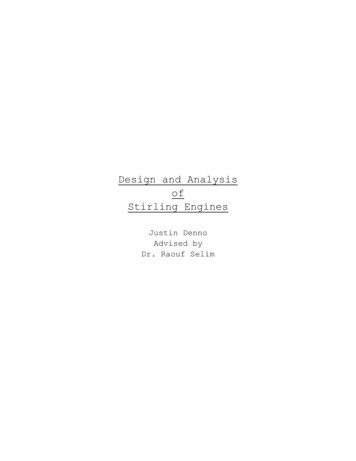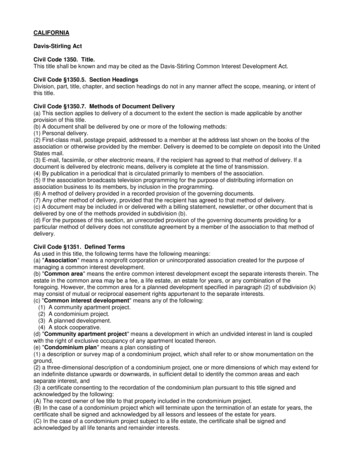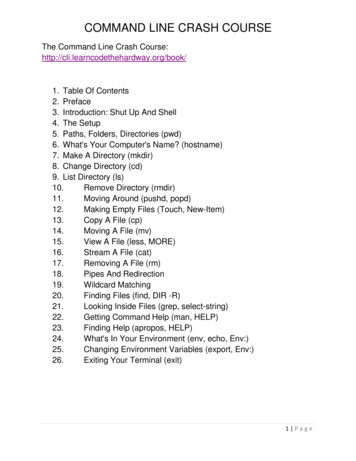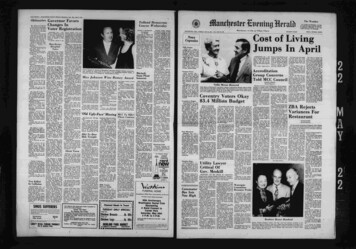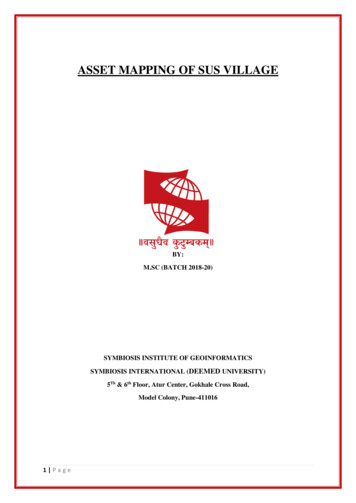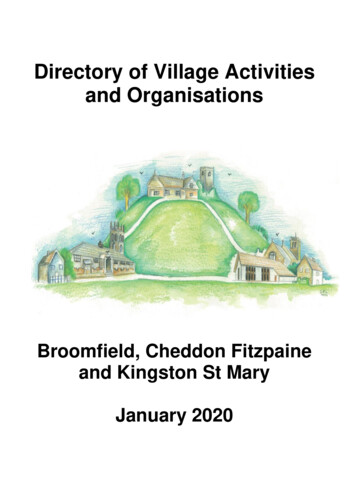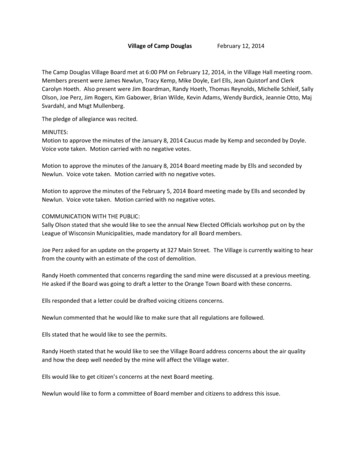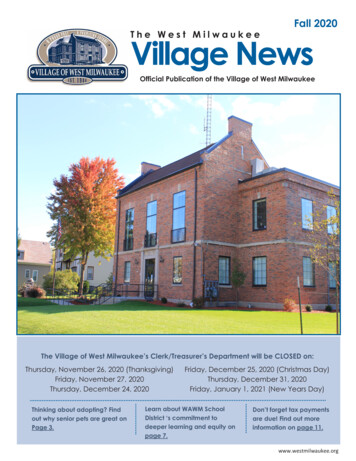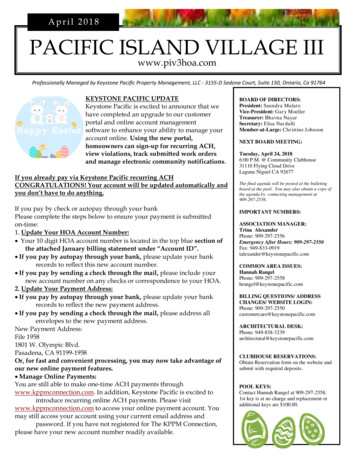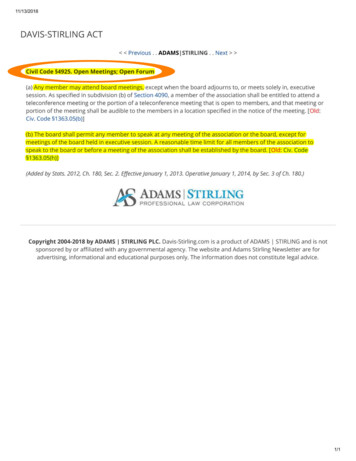
Transcription
11/13/2018DAVIS-STIRLING ACT Previous . ADAMS I STIRLING . Next Civil Code §4925. Open Meetings; Open Forum(a) Any member may attend board meetings, except when the board adjourns to, or meets solely in, executivesession. As specified in subdivision (b) of Section 4090, a member of the association shall be entitled to attend ateleconference meeting or the portion of a teleconference meeting that is open to members, and that meeting orportion of the meeting shall be audible to the members in a location specified in the notice of the meeting. [ Old :Civ. Code §1363.0S(b)](b) The board shall permit any member to speak at any meeting of the association or the board, except formeetings of the board held in executive session. A reasonable time limit for all members of the association tospeak to the board or before a meeting of the association shall be established by the board. [Old: Civ. Code§1363.0S(h)](Added by Stats. 2012, Ch. 180, Sec. 2. Effective January 1, 2013. Operative January 1, 2014, by Sec. 3 of Ch. 180.).--. SSTIRLINGPROFESSIONAL LAW CORPORATIONCopyright 2004-2018 by ADAMS I STIRLING PLC. Davis-Stirling.com is a product of ADAMS I STIRLING and is notsponsored by or affiliated with any governmental agency. The website and Adams Stirling Newsletter are foradvertising, informational and educational purposes only. The information does not constitute legal advice.1/ 1
11 /13/2018OPEN FORUMA board meeting is a meeting of the corporation's board of directors, not a meeting of association members.Accordingly, members do not have a right to participate in the board's discussions and votes. By statute, memberscan observe the board conduct business.Open Forum. In addition to observing, members can address the board during the open forum portion of themeeting. This is the same policy followed by municipalities at city council meetings. The open forum applies toopen (non- executive session) board meetings (Civ. Code §4925, §SOOO(b)). At that time, members can speak on anyissue, whether on the agenda or not. (Civ. Code §4930(a).)Inviting Comments. Although members do not have a legal right to participate in board discussions, the presidentcan invite comments from the audience on particular items of business if he so chooses. This is at the discretion ofthe board. Once comments have been received, discussion can be closed and a vote taken by the directors (or thematter tabled).A practice that we followPlacement on Agenda. There is no prescribed point in the course of a meeting for hold open forum. Some boardsput it at the beginning and some at the end of the meeting's agenda .Gettysburg Address was only 2 minutesTime Allocation. The Davis-Stirling Act requires that a reasonable amount of time be set aside by the board for theopen forum. Members can ask questions but directors are limited in how they can answer them.Open Forum Topics. The Open Meeting Act allows the board to establish reasonable time limits but there is nolimit on the number of topics members can raise. (Civ. Code §4930(a).) Boards cannot create unreasonable rulesthat would stifle a member's right to address the board. Boards can, however, place reasonable restrictions onsome topics. For example, personnel issues should be addressed privately with the board or in writing to theboard, not publicly. For example, topics should not: involve a matters outside the board's authority,be defamatory, indecent, abusive, or involve personal attacks or threats, legal or otherwise,involve personnel issues,involve the disclosure of confidential information,maintenance issues can be raised during open forum but are often better addressed in writingwith the management company.If the board has a lengthy agenda, it may ask members to limit their comments to agenda items only so everyonehas an opportunity to speak to those issues before the board addresses them.Answering Questions. Boards are restricted by statute in the answering of questions.Dialogue could constitutean agenda item.Disruptive Behavior. Members do not have unlimited free speech rights. The right to address the board does notgive members the right to shout, use profanity or make obscene or threatening remarks. Members who engage insuch behavior may be ejected from the meeting. Directors should not attempt to physically remove a member whorefuses to leave. Instead, the police may be called to escort the person out of the meeting or, in lieu of calling thepolice, the meeting may be adjourned to another location without the disruptive person. In addition, the disruptiveperson may be fined for their behavior if there are rules against such conduct. Following are sample meeting rules:MEETING RULES: No audio or video recording allowed by attendees. However, the Secretary mayrecord the meeting to aid in the preparation of minutes. The recording is deleted once the minuteshave been prepared. As provided in the "Open Meeting Act," members may observe the meeting butdo not have the right to participate in the Board's deliberations or votes. Members may address1/2
11/13/2018issues during the Open Forum portion of the meeting. Attendees may not engage in obscenegestures, shouting, profanity or other disruptive behavior. If attendees become disruptive, they maybe expelled from the meeting and fined.To ensure everyone is aware of the rules, boards should print them on each meeting's agenda. See sample agenda .ASSISTANCE: Associations needing legal assistance can contact us. To stay current with issues affecting communityassociations, subscribe to the Davis-Stirling Newsletter. , SSTIRLINGPROFESSIONAL LAW CORPORATIONCopyright 2004-2018 by ADAMS I STIRLING PLC. Davis-Stirling.com is a product of ADAMS I STIRLING and is notsponsored by or affiliated with any governmental agency. The website and Adams Stirling Newsletter are foradvertising, informational and educational purposes only. The information does not constitute legal advice.212
11/13/2018DAVIS-STIRLING ACT Previous . ADAMS ISTIRLING . Next Civil Code §4930. Limitations on Meeting Content.[Old : Civ. Code §1363.0S(i)](a) Except as described in subdivisions (b) to (e), inclusive, the board may not discuss or take action on any item at anonemergency meeting unless the item was placed on the agenda included in the notice that was distributedpursuant to subdivision (a) of Section 4920 . This subdivision does not prohibit a member or resident who is not adirector from speaking on issues not on the agenda.(b) Notwithstanding subdivision (a), a director, a managing agent or other agent of the board, or a member of thestaff of the board, may do any of the following:(1) Briefly respond to statements made or questions posed by a person speaking at a meeting asdescribed in subdivision (b) of Section 4925 .(2) Ask a question for clarification, make a brief announcement, or make a brief report on the person'sown activities, whether in response to questions posed by a member or based upon the person's owninitiative.(c) Notwithstanding subdivision (a), the board or a director, subject to rules or procedures of the board, may do anyof the following:(1) Provide a reference to, or provide other resources for factual information to, its managing agent orother agents or staff.(2) Request its managing agent or other agents or staff to report back to the board at a subsequentmeeting concerning any matter, or take action to direct its managing agent or other agents or staff toplace a matter of business on a future agenda.(3) Direct its managing agent or other agents or staff to perform administrative tasks that arenecessary to carry out this section .(d) Notwithstanding subdivision (a), the board may take action on any item of business not appearing on theagenda distributed pursuant to subdivision (a) of Section 4920 under any of the following conditions:As a reminder, The Board must limit their response:(1) Upon a determination made by a majority of the board present at the meeting that an emergencysituation exists. An emergency situation exists if there are circumstances that could not have beenreasonably foreseen by the board, that require immediate attention and possible action by the board,and that, of necessity, make it impracticable to provide notice.During open forum, members must keep proper decorum:(2) Upon a determination made by the board by a vote of two-thirds of the directors present at themeeting, or, if less than two-thirds of total membership of the board is present at the meeting, by aunanimous vote of the directors present, that there is a need to take immediate action and that theneed for action came to the attention of the board after the agenda was distributed pursuant tosubdivision (a) of Section 4920.(3) The item appeared on an agenda that was distributed pursuant to subdivision (a) of Section 4920for a prior meeting of the board that occurred not more than 30 calendar days before the date that1/2
11/13/2018action is taken on the item and, at the prior meeting, action on the item was continued to the meetingat which the action is taken.(e) Before discussing any item pursuant to subdivision (d), the board shall openly identify the item to the membersin attendance at the meeting.(Added by Stats. 2012, Ch. 180, Sec. 2. Effective January 1, 2013. Operative January 1, 2014, by Sec. 3 of Ch. 180.)ADAMS STIRLINGPROFESSIONAL LAW CORPORATIONCopyright 2004-2018 by ADAMS I STIRLING PLC. Davis-Stirling.com is a product of ADAMS I STIRLING and is notsponsored by or affiliated with any governmental agency. The website and Adams Stirling Newsletter are foradvertising, informational and educational purposes only. The information does not constitute legal advice.212
Davis-Stirling.com is a product of ADAMS I STIRLING and is not sponsored by or affiliated with any governmental agency. The websi
